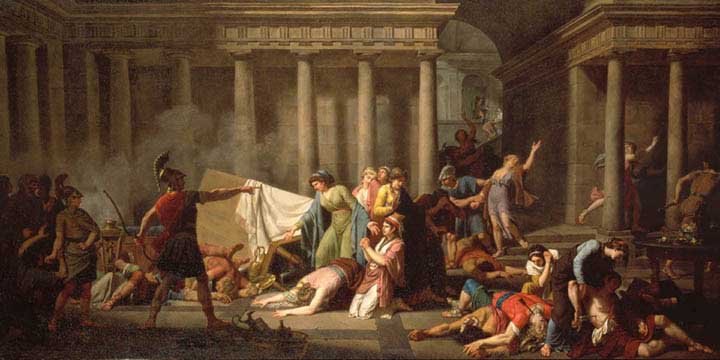
Return of Odysseus, Nicholas Monsiau (early 1800’s)
On Monday I described my friend Alan as an Odysseus figure for the way he has coming back, time after time, in his battle with his cancer. He appreciated the article but was taken aback by the comparison and asked why I hadn’t compared him instead with someone like Holden Caulfield. He said he didn’t feel particularly brave. He was just grateful to be alive, to appreciate what was happening each day, and to be with his wife Jackie.
The shift from Odysseus to Holden Caulfield recalls for me the different kinds of hero described by Northrup Frye in his monumentally ambitious Anatomy of Criticism, a work of literary theory that attempts to schematize all of literature. In Frye’s framework, Odysseus and Holden are heroes at opposite ends of the hero spectrum.
As an epic hero, Odysseus has direct contact with the gods and his actions ring with cosmic significance. How do we know that he should return home to Ithaca? Because Zeus himself has said it is important.
Frye’s other levels include “the romance,” where the gods have “retreated to the sky” so that heroes must find their way without their direct aid (although they remember them); “high mimetic,” where new authority has been invested in the nation state rather than in the gods (think, say, of Shakespeare’s heroes); “low mimetic,” where the hero is no longer a person of high birth but someone who is noteworthy for processing the world through his or her own heroic individuality (think of the romantic poets). And then, finally, the ironic.
The ironic hero is a mere observer and has little power other than to comment on what goes on about him. He is “one who will do/ To swell a crowd, observe a scene or two,” as T. S. Eliot’s self-hating ironic hero J. Alfred Prufrock puts it.
Odysseus is an epic hero, Holden Caulfield an ironic one. So which one is Alan?
I acknowledge that the age we live in can seem more ironic than epic. Rather than have heroes who speak with divine authority or move mountains, we have, at best, fallible men and women who try to make a little change here or there. Barack Obama may have hoped to usher in an epic period of “change we can believe in,” but it has taken everything he has to install a mostly universal health care system that is still a pale imitation of what, say, France has.
In this day and age, those who try to seize the high mimetic or even epic hero stance (George W. Bush at times claimed to be getting instructions from Jesus Christ) instead get us involved in endless and pointless wars, which they’d like us to forget about when things begin going badly. If that is the alternative, I’d rather have a president who is a competent functionary.
So yes, maybe it sounds overblown to call Alan an epic hero. But I am of the Joseph Campbell persuasion that we are all the heroes of our own lives and can find patterns in them by consulting the world’s myths. In my own (fevered?) imagination, the hero has a thousand faces and one of those faces is ours. Each of us has our own version of the the hero’s epic journey. We encounter threshold guardians, battle through dark “belly of the whale” experiences, receive help from wise old men and women, resist temptresses and defeat monsters, and find health-restoring elixirs, which we share with our societies.
In fact, I see each of my students involved in such epic journeys. It just so happens that I have been talking to one in recent days who several years wrote his senior project about Campbell’s quest. Thomas was a sensitive African American man who had a debilitating stammer. When he spoke up in class, it would sometimes take four or five tries before he could get his ideas out. Yet he never stopped trying.
Given all the hardships that the stammer imposed on Thomas, applying the word “heroic” to him does not seem hyperbolic. Campbell provided him with a powerful framework to see his life, both the setbacks and the breakthroughs. Thomas wrote about Sir Gawain and the Green Knight among other works and saw the Green Knight as the threshold guardian challenging him to ride out into the world despite his fears. Could he believe in himself enough to take the green girdle openly and embrace life?
Gawain, who is in Frye’s romance category, spoke to youthful Thomas’s idealism. By contrast, J.D. Salinger’s ironic (and Jewish) vision speaks more to Alan’s sense of a world as a hard place where we may have to settle for survival. Hold on to your integrity and don’t be a phoney. But forget about grand gestures. They won’t serve you.
Whereas I find myself buoyed up by the epic vision, which in turn makes me vulnerable to dark disillusion. Maybe it’s my WASP heritage speaking. There’s an American tradition of being tossed endlessly between the two.
So I see Alan as an epic hero whereas he sees himself as an ironic one. What’s important is that we find a stance that helps us handle the challenges we face.


One Trackback
[…] friend Alan Paskow, whom I called an Odysseus for his courageous battle with his cancer and who countered that he felt more like Holden Caulfield. Rachel insisted that, while we can’t vouch for how […]